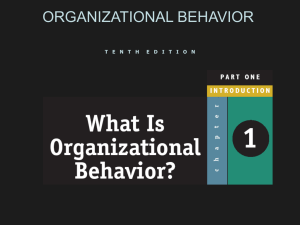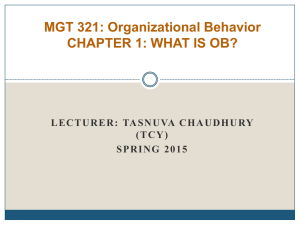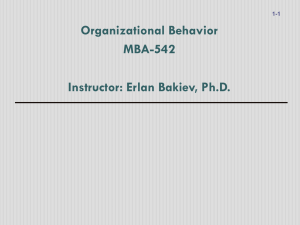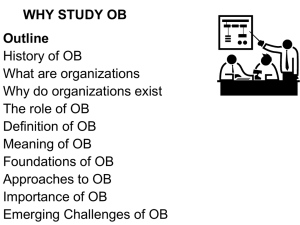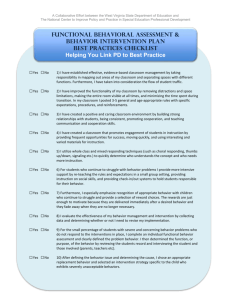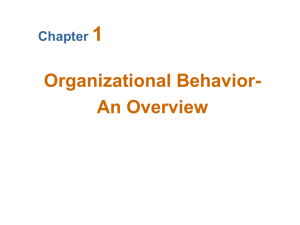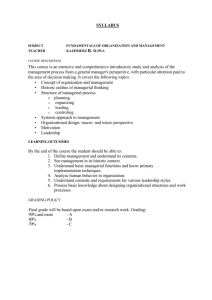File
advertisement
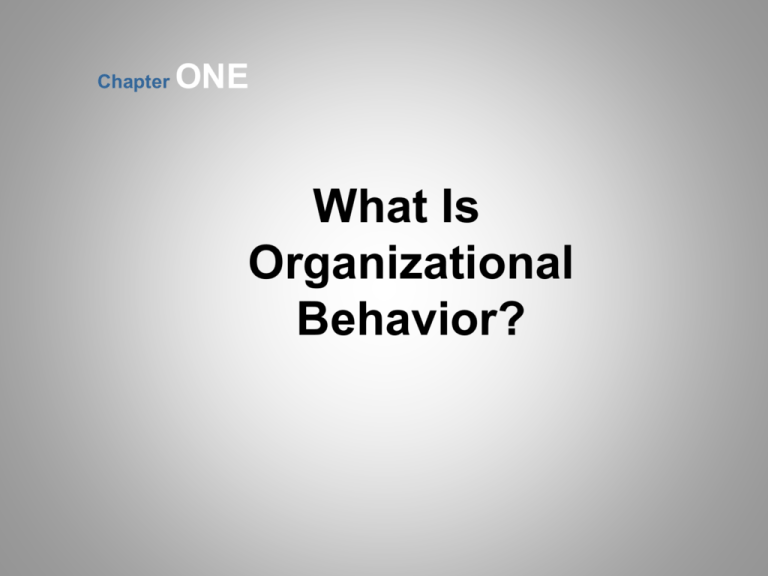
Chapter ONE What Is Organizational Behavior? What Managers Do Managers (or Administrators) Individuals who achieve goals through other people Managerial Activities • Make decisions • Allocate resources • Direct activities of others to attain goals Where Managers Work Organization A consciously coordinated social unit, composed of two or more people, that functions on a relatively continuous basis to achieve a common goal or set of goals Management Functions Planning Organizing Management Functions Controlling Leading Managerial Skills In addition to fulfilling roles, managers also need a number of specific skills. The most fundamental management skills are: – – – – – – – Technical Interpersonal Conceptual Diagnostic Communication Decision-making Time-management Effective Versus Successful Managerial Activities (Luthans) 1. Traditional Management • Decision making, planning, and controlling 2. Communication • Exchanging routine information and processing paperwork 3. Human Resource Management • Motivating, disciplining, managing conflict, staffing, and training 4. Networking • Socializing, politicking, and interacting with others Successful vs. Effective Allocation by Time Managers who promoted faster (were successful) did different things than did effective managers (those who did their jobs well) 1-8 Enter Organizational Behavior Organizational Behavior (OB) A field of study that investigates the impact that individuals, groups, and structure have on behavior within organizations, for the purpose of applying such knowledge toward improving an organization’s effectiveness Intuition and Systematic Study Intuition • Gut feelings • Individual observation • Common sense Systematic Study • Looks at relationships • Scientific evidence • Predicts behaviors The two are complementary means of predicting behavior. 1-10 An Outgrowth of Systematic Study… Evidence-Based Management (EBM) Basing managerial decisions on the best available scientific evidence Must think like scientists: Pose a managerial question Search for best available evidence Apply relevant information to case 1-11 Managers Should Use All Three Approaches The trick is to know when to go with your gut. – Jack Welsh Intuition is often based on inaccurate information Faddism is prevalent in management Systematic study can be time consuming Use evidence as much as possible to inform your intuition and experience. That is the promise of OB. 1-12 Contributing Disciplines to the OB Field Psychology The science that seeks to measure, explain, and sometimes change the behavior of humans and other animals Contributing Disciplines to the OB Field (cont’d) Sociology The study of people in relation to their fellow human beings Contributing Disciplines to the OB Field (cont’d) Social Psychology An area within psychology that blends concepts from psychology and sociology and that focuses on the influence of people on one another Contributing Disciplines to the OB Field (cont’d) Anthropology The study of societies to learn about human beings and their activities Basic OB Model, Stage I Model An abstraction of reality A simplified representation of some real-world phenomenon Types of Study Variables Independent (X) Dependent (Y) – The presumed cause of the change in the dependent variable (Y). – This is the variable that OB researchers manipulate to observe the changes in Y. X Y – This is the response to X (the independent variable). – It is what the OB researchers want to predict or explain. – The interesting variable! Predictive Ability 1-19 There Are Few Absolutes in OB Contingency variables: “It Depends!” Situational factors that make the main relationship between two variables change—e.g., the relationship may hold for one condition but not another In Country 1 x May be related to y In Country 2 x May NOT be related to y Few Absolutes in OB Contingency Variable (Z) Independent Variable (X) Dependent Variable (Y) In American Culture Boss Gives “Thumbs Up” Sign Understood as Complimenting In Iranian or Australian Cultures Boss Gives “Thumbs Up” Sign Understood as Insulting - “Up Yours!” 1-21 The Dependent Variables (cont’d) Productivity A performance measure that includes effectiveness and efficiency Effectiveness Achievement of goals Efficiency Meeting goals at a low cost The Dependent Variables (cont’d) Absenteeism The failure to report to work Turnover The voluntary and involuntary permanent withdrawal from an organization The Dependent Variables (cont’d) Deviant Workplace Behavior Voluntary behavior that violates significant organizational norms and thereby threatens the well-being of the organization and/or any of its members The Dependent Variables (cont’d) Organizational Citizenship Behavior (OCB) Discretionary behavior that is not part of an employee’s formal job requirements, but that nevertheless promotes the effective functioning of the organization The Dependent Variables (cont’d) Job Satisfaction A general attitude (not a behavior) toward one’s job; a positive feeling of one's job resulting from an evaluation of its characteristics The Independent Variables The independent variable (X) can be at any of these three levels in this model: Individual – Biographical characteristics, personality and emotions, values and attitudes, ability, perception, motivation, individual learning, and individual decision making Group – Communication, group decision making, leadership and trust, group structure, conflict, power and politics, and work teams Organization System – Organizational culture, human resource policies and practices, and organizational structure and design 1-27 OB Model Three Levels Dependent Variables (Y) Independent Variables (X) 1-28 Challenges and Opportunities for OB Responding to Economic Pressures Responding to Globalization Managing Workforce Diversity Improving Quality and Productivity Improving Customer Service Improving People Skills Stimulating Innovation and Change Coping with “Temporariness” Working in Networked Organizations Helping Employees Balance Work-Life Conflicts Creating a Positive Work Environment Improving Ethical Behavior 1-29 Responding to Economic Pressures What do you do during difficult economic times? – Effective management is critical during hard economic times. – Managers need to handle difficult activities such as firing employees, motivating employees to do more with less and working through the stress employees feel when they are worrying about their future. – OB focuses on issues such as stress, decision making, and coping during difficult times. 1-30 Responding to Globalization Increased foreign assignments Working with people from different cultures Overseeing movement of jobs to countries with lowcost labor 1-31 Managing Workforce Diversity The people in organizations are becoming more heterogeneous demographically – – – – Embracing diversity Changing demographics Changing management philosophy Recognizing and responding to differences Disability Domestic Partners Race Religion Gender Age National Origin 1-32 Managing for Effectiveness
